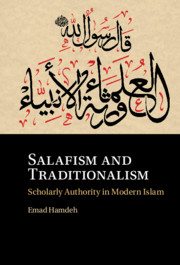Introduction
Published online by Cambridge University Press: 08 March 2021
Summary
How does one understand scripture? What role do scholars play in understanding religious texts? What should lay Muslims do when they encounter scripture that conflicts with a scholarly opinion? These questions are often at the center of religious disputes among Muslims in the modern world and have sparked debates among scholars and nonscholars alike. The fierce intellectual debates between Salafis and Traditionalists have been a prominent feature of Islamic intellectual history in the twentieth century. Although they both draw from the same sources, each of these groups considers itself to be the authentic version of Islam. Traditionalism is an institutional understanding of Islam that developed over centuries of scholarship. Traditionalists advocate a deference to precedent (taqlīd) of the madhhabs as a means for Muslims to understand Islam.1 On the other hand, purist Salafis view themselves as a group that is purifying the syncretic practices that crept into the faith over many centuries. Salafis consider the uncritical following of the madhhabs to be the root cause of the Muslim world’s political, economic, and social decline. They advocate for a return to the Qurʾān and Sunna as they were understood by the earliest Muslim generations.
- Type
- Chapter
- Information
- Salafism and TraditionalismScholarly Authority in Modern Islam, pp. 1 - 6Publisher: Cambridge University PressPrint publication year: 2021

